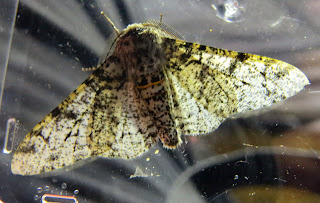 |
| Drinker |
It was a miserable start to the morning as I returned to Strumpshaw for my shift. It was raining, but this didn't stop Ben and other staff members from rummaging through two moth traps by the office. They caught a lot of great stuff despite the rain, but there were no hornets among them. Here's what they caught during the night...
 |
| Poplar Hawk-moth |
 |
| Buff Arches |
 |
| Garden Tiger |
 |
| Swallow Prominent |
 |
| Mother of Pearl |
 |
| Black Arches |
 |
| Kingfisher |
Due to the wet weather, I did not bother with a walk this morning. Instead, I spent most of my time sheltering inside Reception Hide. The kingfishers made it worth while as they kept flying back and forth across the broad and hanging within its favourite reed bed to my left between the two channels. I managed to get one photo of it hovering in the air before hiding behind some reed stems which obstructed my view. It even sat on the perches in front of the hide for at least two seconds at a time twice, not long enough for me to grab my camera in time.
 |
| Juvenile Moorhen |
 |
| A soggy looking Marsh Harrier |
Also from Reception Hide were great crested grebes, about four herons, plenty of mallards in their eclipse phase plumage (not looking their best in other words), cormorants, several bearded tits and warblers (mostly reed and sedge with the odd Cetti's) darting from reed bed to reed bed, a few young marsh harriers sitting on bushes and begging for a meal from their parents and there was this Chinook helicopter flying incredibly low over the reserve! The Chinook pretty much caused a lot of panic with the birds temporarily. I was not happy about that, but it was soon out of sight after that short disturbance.
 |
| Two youngsters together |
 |
| Grey Heron |

 |
| Cormorant |
 |
| Great Crested Grebe |
 |
| Mute Swan |
 |
| Chinook helicopter |
 |
| My butterflies! |
As it is now the summer break and the schools are closed until September, the staff at Strumpshaw have opened a summer nature trail for children to do. Most of it has already been set up, but today I was asked to colour in some hand-made butterflies for the trail. I was told to make them look like a recognizable British species. So with special colouring pens in hand, I coloured in the plastic butterfly wings and created a red admiral and an orange-tip. There was no white, so I had to leave those areas blank. What you think? Not too bad for a quick scribble around, right?
 |
| Red Admiral (the real thing!) |
 |
| Kestrel |
 |
| Dark Bush Cricket |
 |
| Garganey |
By lunch time, it was brightening up despite a few black clouds hanging over the reserve. After our shifts were over, my colleague and I decided to risk a walk to Tower Hide and along the Lackford Run this afternoon. There has been reports of a flock of garganey at Tower Hide all this week. Garganey are rarely seen on the reserve in numbers more than two, so I was quite interested in seeing them. When we arrived at the hide, there were about 8-9 of them right in front of us.







At this time of year, they look rather drab and brown due to moulting, with the males losing their chocolate brown and grey plumage. You can still identify them as garganey though, as they are smaller than most of the other ducks here and there is still a faint white or creamy stripe above the eye. I've already ticked these birds off my challenge sheet earlier in the year, but it is always a great bird to see again. However, I am still looking for willow emerald damselflies after a quick search along the Lackford Run ditches.
 |
| Common Tern |
 |
| Chinese Water Deer |
 |
| Southern Hawker |





































































